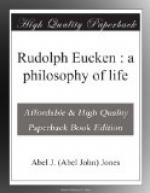These two factors worked in the same direction, namely, that of rendering less necessary the conception of a spiritual world. The interest of mankind became so concentrated upon material things that the interest in the invisible decreased, while the mechanical, soulless elements with their ceaseless actions and reactions in definite order, and according to inviolable law, were held sufficient to account for the phenomena of nature. The keynote was “relation to environment”; a constantly changing environment, changing according to law, called for ceaseless readjustment, and the adaptation to environment was held to be the stimulus to all activity in the natural world.
The later development of biology, and the doctrine of the evolution of species, gradually extended this conception of nature to include man himself.
What he had regarded as his distinctive characteristics were held to be but the product of natural factors, and his life was regarded, too, as under the domain of rigid, inviolable law. There was no room for, and no need of, the conception of free, originative thought. Thought was simply an answer to the demand that the sense world was making, entirely dependent upon the external stimulus, just as any other activity was entirely dependent on an external stimulus. So thought came to be regarded as resulting from mere sense impression, which latter corresponded to the external stimulus. It is obvious that the idea of the freedom of the human soul, and of human personality as previously understood, had to go. Man was simply the result of the interaction of numerous causes—and like the rest of nature, involved no independent spiritual element. Everything that was previously regarded as spiritual was interpreted as a mere adjunct to, or a shadow of, the sense world. Such a conception accounted for the whole of nature and of man, and so became an explanation of the universe, a philosophy.
In such a theory self-preservation becomes the aim of life, the struggle for existence the driving-power, and adaptation to environment the means to the desired end. Hence it comes about that only one standard of value remains, that of usefulness, for that alone can be regarded as valuable which proves to be useful towards the preservation and enjoyment of the natural life. The ideas of the good, the beautiful, and the true, lose the glory of their original meaning, and become comparatively barren conceptions. Hence at a stroke the spiritual world is wiped away, the soul of man is degraded from its high position, the great truths of religion are cast aside as mere illusions.
The naturalistic explanation possesses the apparent advantage of being a very simple one, and hence attracts the human mind with great force in the early stages of mental culture. All the difficulties of the conception of a higher world are absent, for the naturalistic position does not admit of its existence. It gives, too, some purpose to life, even though that purpose is not an ideal one.




